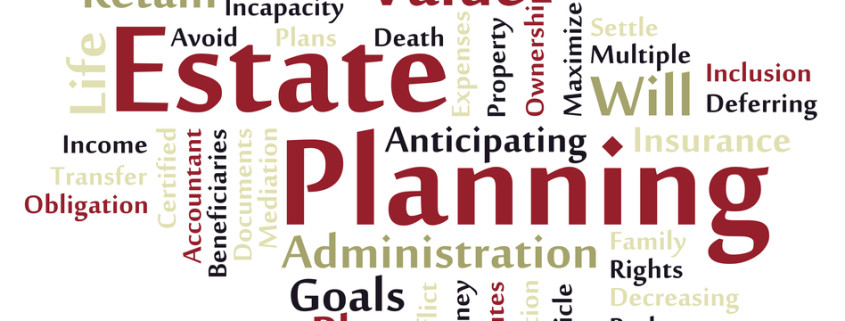A Quick & Easy Guide to Basic Estate Planning
So, you’re thinking about putting an estate plan together (good for you!), but not sure if the timing is right, what to do, or what you need. To help you get going, here is my quick and easy estate planning guide. Don’t worry, nothing complicated here, just basic information.
Is the time right? Well, estate planning is planning for the future. Planning for when you are not able to take care of yourself, and planning for what will happen after you die. I tell clients that as long as they’re alive it’s not too late. But remember, “tempus fugit” – time flies – and we don’t know what tomorrow will bring, so the best time to plan is now!
Do you need an estate plan? Estate planning isn’t just for the wealthy. You need an estate plan if you want to designate the person who will make financial and medical decisions for you if you can’t do so yourself (if you don’t a probate court judge will), or if you want to name a guardian for your minor children (if you don’t a probate judge will), or if you want to designate who will receive your property after you die (if you don’t, Michigan law will dictate who gets what). So forget those notions that estate planning is something only rich people need to do.
Do you need a lawyer? YES! Work with a competent lawyer. It will cost more than you’d pay for a DIY kit, but it’s worth the additional expense and trust me, way cheaper in the long run. Despite what you may have heard on the radio or seen on television, estate planning is not a “one size fits all” endeavor. Sure, those DIY documents may be legal in all 50 states, but will those cookie cutter documents be sufficient to carry out your wishes when the time comes? A lawyer can help you examine the big picture, give you guidance and recommendations, and most importantly draft custom, tailored documents to help you achieve your particular planning goals and objectives.
So what should be in your estate plan? There are five elements that form the basis of an effective estate plan.
Last will and testament. A last will and testament does primarily three things: Direct who will take care of minor children; Appoint someone to tie up all of your loose ends and file/pay taxes; Specify how your property gets distributed after you die. You can make a will as long as you meet certain legal standards. In Michigan, that means one has to be at least 18 years old and have sufficient “testamentary capacity” – basically the ability to understand the nature and gravity of what one is doing. As people age their mental capacity can become an issue. However, even if a person has diminished mental capacity due to mild dementia or other condition he or she may still have the capacity to make a will.
A last will and testament takes effect after you die, so it’s important to have planned in some way to ensure that someone will look after your affairs and make decisions for you if you become incapacitated during your lifetime. For that you need a power of attorney and a medical power of attorney (patient advocate designation).
Power of attorney. With a power of attorney, you appoint an agent to handle your financial affairs and other transactions if you become incapacitated. Everything from banking and bill paying to preparing and filing tax returns on your behalf can be handled by your agent. Your agent will be able to keep your affairs in order until you regain the ability to do so. A durable power of attorney can be designed to take effect the moment you sign it, or at some point in the future if and when you become incapacitated. The agent can be a spouse, family member, or trusted friend or adviser.
Medical power of attorney. In Michigan, the medical power of attorney, or patient advocate designation, is authorized by law. It allows you to appoint someone (your “patient advocate”) to make medical treatment decisions for you in the event you cannot make them for yourself. Your patient advocate can access medical records, talk to your doctors and make treatment decisions for you as long as you can’t make them for yourself. It may contain expressions of your desires concerning medical treatment at the point where your condition is such that there is no longer any prospect of a recovery, such as at the end-stage of a terminal illness. These instructions will ensure that you live your last days in dignity and peace.
Revocable, or living trust. Do you need one? It depends. What are your goals and objectives; what types of assets do you own; do you desire to avoid probate or minimize taxes; do you desire to maintain control of your assets even after you die? These are some of the issues to address in determining whether a trust will be a beneficial element of your estate plan. While you’re alive, a trust can be beneficial during times of incapacity. Assets that are held in trust can continue to be managed and controlled by someone you’ve designated as your trustee until you’ve regained the ability to resume managing them for yourself, without having to involve the courts. After you die, a trust can help avoid probate on the transfer of assets, maintain privacy of your affairs, provide long term control and management of assets (especially helpful if you have younger children or other beneficiaries who may not be capable of managing an inheritance on their own), minimize the effect of taxes on the disposition of assets, and even take care of a beloved pet.
Beneficiary designations. What do beneficiary designations have to do with estate planning? Many common assets do not pass through a will or trust. Among them are life insurance benefits and retirement plan assets. These assets pass to the person(s) designated as beneficiaries. Even if a will says who gets the life insurance, it won’t matter if the life insurance policy has a beneficiary designated. So, as part of your estate plan, it’s important to make sure that you’ve designated beneficiaries for assets such as life insurance, annuities, and retirement plan accounts, and to make sure those beneficiaries designations are up to date.
So there you have it. A quick and easy guide to basic estate planning. (Nothing to it!) Now that you’ve got some basic information, it’s time to get your plan in place.
If you’d like to get started, contact me, I can help.



